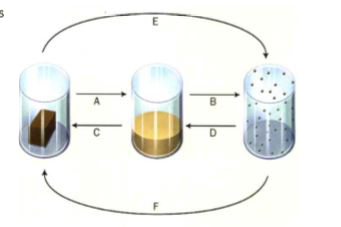Is there any difference between the phrases 'change of state' and 'change of phase' when used in thermodynamics?
To address the question of whether there is a difference between the phrases "change of state" and "change of phase" in thermodynamics, we can break down the concepts step by step.
1. Define Change of State:
- The change of state refers to a transformation in the condition of a system. This condition can be described using various thermodynamic properties such as temperature, pressure, and volume.
- For example, if a gas is compressed from a certain pressure (P1) and volume (V1) to a new pressure (P2) and volume (V2), we say that the system has undergone a change of state.
2. Define Change of Phase:
- Change of phase specifically refers to the transition between different states of matter: solid, liquid, and gas.
- Common examples include melting (solid to liquid), freezing (liquid to solid), vaporization (liquid to gas), and condensation (gas to liquid).
- These transitions occur at specific temperatures and pressures, often referred to as phase transitions.
3. Comparison:
- While both terms involve changes in a system, "change of state" is broader and encompasses any alteration in the thermodynamic properties of a system.
- In contrast, "change of phase" is a specific type of change that involves the transformation of matter from one phase to another.
4. Conclusion:
- In summary, there is a distinction between the two phrases. Change of state refers to any change in the thermodynamic properties of a system, while change of phase specifically refers to transitions between solid, liquid, and gas phases.
Final Answer:
No, there is a difference between "change of state" and "change of phase" in thermodynamics. Change of state refers to any alteration in the thermodynamic properties of a system, while change of phase refers specifically to the transitions between solid, liquid, and gas.
---
- The change of state refers to a transformation in the condition of a system. This condition can be described using various thermodynamic properties such as temperature, pressure, and volume.
- For example, if a gas is compressed from a certain pressure (P1) and volume (V1) to a new pressure (P2) and volume (V2), we say that the system has undergone a change of state.
- Change of phase specifically refers to the transition between different states of matter: solid, liquid, and gas.
- Common examples include melting (solid to liquid), freezing (liquid to solid), vaporization (liquid to gas), and condensation (gas to liquid).
- These transitions occur at specific temperatures and pressures, often referred to as phase transitions.
- While both terms involve changes in a system, "change of state" is broader and encompasses any alteration in the thermodynamic properties of a system.
- In contrast, "change of phase" is a specific type of change that involves the transformation of matter from one phase to another.
- In summary, there is a distinction between the two phrases. Change of state refers to any change in the thermodynamic properties of a system, while change of phase specifically refers to transitions between solid, liquid, and gas phases.
No, there is a difference between "change of state" and "change of phase" in thermodynamics. Change of state refers to any alteration in the thermodynamic properties of a system, while change of phase refers specifically to the transitions between solid, liquid, and gas.
Topper's Solved these Questions
- INTERNAL ENERGY Book:ICSEChapter:INTERNAL ENERGY Exercise:VERY SHORT ANSWER QUESTIONS
Explore 17 Videos
- INTERNAL ENERGY Book:ICSEChapter:INTERNAL ENERGY Exercise:SELECTED PROBLEMS (FROM FIRST LAW OF THERMODYNAMICS )
Explore 6 Videos
- INTERNAL ENERGY Book:ICSEChapter:INTERNAL ENERGY Exercise:LONG ANSWER QUESTIONS
Explore 8 Videos
- GRAVITATIONBook:ICSEChapter:GRAVITATIONExercise:FROM THE HUBBLE TELESCOP
Explore 2 Videos
- MOTION IN FLUIDS Book:ICSEChapter:MOTION IN FLUIDS Exercise:SELECTED PROBLEMS (FROM POISEUILLE.S FORMULA)
Explore 19 Videos
Similar Questions
Give the main differences between physical changes and chemical changes.
View SolutionState two differences between a chamical change and a nuclear change.
View SolutionThe difference between phase and frequency modulation
View SolutionWrite phase changes in the diagram.

View SolutionState any two differences between spermatogenesis and oogenesis.
View SolutionState any two differences between Peltier effect and Joule effect.
View SolutionTrue or False: All changes of state are physical changes.
View SolutionState any two differences between primary rainbow and secondary rainbow.
View SolutionState four differences between physical and chemical changes.
View SolutionWhat is the phase difference between any two points lying on the same wavefront
View Solution